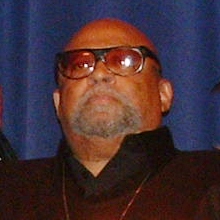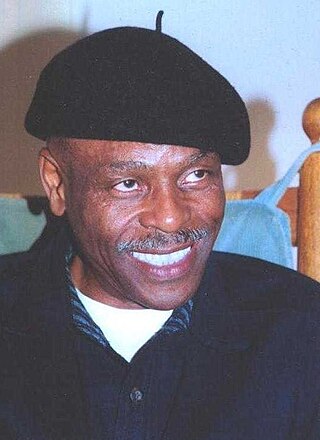Related Research Articles

Fredrick Allen Hampton Sr. was an American activist. He came to prominence in Chicago as deputy chairman of the national Black Panther Party and chair of the Illinois chapter. As a progressive African American, he founded the antiracist, anticlassist Rainbow Coalition, a prominent multicultural political organization that initially included the Black Panthers, Young Patriots, and the Young Lords, and an alliance among major Chicago street gangs to help them end infighting and work for social change. A Marxist–Leninist, Hampton considered fascism the greatest threat, saying, "nothing is more important than stopping fascism, because fascism will stop us all.”

Maulana Ndabezitha Karenga, previously known as Ron Karenga, is an American activist, author, and professor of Africana studies, best known as the creator of the pan-African and African-American holiday of Kwanzaa.

The Black Liberation Army (BLA) was a far-left, black nationalist, underground Black Power revolutionary paramilitary organization that operated in the United States from 1970 to 1981. Composed of former Black Panthers (BPP) and Republic of New Afrika (RNA) members who served above ground before going underground, the organization's program was one of war against the United States government, and its stated goal was to "take up arms for the liberation and self-determination of black people in the United States." The BLA carried out a series of bombings, killings of police officers and drug dealers, robberies, and prison breaks.

Daryl Gates was the Chief of the Los Angeles Police Department (LAPD) from 1978 to 1992. His length of tenure in this position was second only to that of William H. Parker. Gates is co-credited with the creation of SWAT teams with LAPD's John Nelson, who others claim was the originator of SWAT in 1965. Gates also co-founded D.A.R.E.

The Black Power movement was a branch or counterculture within the civil rights movement of the United States, reacting against its more moderate, mainstream, or incremental tendencies and motivated by a desire for safety and self-sufficiency that was not available inside redlined African American neighborhoods. Black Power activists founded black-owned bookstores, food cooperatives, farms, media, printing presses, schools, clinics and ambulance services. The international impact of the movement includes the Black Power Revolution in Trinidad and Tobago.

Alprentice "Bunchy" Carter was an American activist. Carter is credited as a founding member of the Southern California chapter of the Black Panther Party. Carter was shot and killed by a rival group, Ron Karenga's "Us", and is celebrated by his supporters as a martyr in the Black Power movement in the United States. Carter is portrayed by Gaius Charles in the 2015 TV series Aquarius.
US Organization, or Organization Us, is a Black nationalist group in the United States founded in 1965. It was established as a community organization by Hakim Jamal together with Maulana Karenga. It was a rival to the Black Panther Party in California. One of the early slogans was, "Anywhere we are US is." "US" referred to "[us] black people" in opposition to their perceived oppressors ("them").

Kuwasi Balagoon, born Donald Weems, was an American political activist, anarchist and member of the Black Panther Party and Black Liberation Army. Radicalised by race riots in his home state of Maryland growing up, as well as by his experiences while serving in the US Army, Weems became the black nationalist known as Kuwasi Balagoon in New York City in the late 1960s. First becoming involved in local Afrocentric organisations in Harlem, Balagoon would move on to become involved in the New York chapter of the Black Panther Party, which quickly saw him charged and arrested for criminal behaviour. Balagoon was initially part of the Panther 21 case, in which 21 panthers were accused of planning to bomb several locations in New York City, but although the Panther 21 were later acquitted, Balagoon's case was separated off and he was convicted of a New Jersey bank robbery.

Michael Zinzun was an African American ex-Black Panther and anti-police brutality activist.
David Hilliard is a former member of the Black Panther Party, having served as Chief of Staff. He became a visiting instructor at the University of New Mexico in 2006. He also is the founder of the Dr. Huey P. Newton foundation.

Gangs in the United States include several types of groups, including national street gangs, local street gangs, prison gangs, motorcycle clubs, and ethnic and organized crime gangs. Approximately 1.4 million people were part of gangs as of 2011, and more than 33,000 gangs were active in the United States.

Akinyele Umoja is an American educator and author who specializes in African-American studies. As an activist, he is a founding member of the New Afrikan People's Organization and the Malcolm X Grassroots Movement. In April 2013, New York University Press published Umoja's book We Will Shoot Back: Armed Resistance in the Mississippi Freedom Movement. Currently, he is a Professor and Department Chair of the Department of African-American Studies at Georgia State University (GSU).

The Black Panther Party (BPP), originally the Black Panther Party for Self-Defense, was a Marxist-Leninist and black power political organization founded by college students Bobby Seale and Huey P. Newton in October 1966 in Oakland, California. The party was active in the United States between 1966 and 1982, with chapters in many major American cities, including San Francisco, New York, Chicago, Los Angeles, Seattle, and Philadelphia. They were also active in many prisons and had international chapters in the United Kingdom and Algeria. Upon its inception, the party's core practice was its open carry patrols ("copwatching") designed to challenge the excessive force and misconduct of the Oakland Police Department. From 1969 onward, the party created social programs, including the Free Breakfast for Children Programs, education programs, and community health clinics. The Black Panther Party advocated for class struggle, claiming to represent the proletarian vanguard.
The Rainbow Coalition was an antiracist, anticlass multicultural movement founded April 4, 1969 in Chicago, Illinois by Fred Hampton of the Black Panther Party, along with William "Preacherman" Fesperman of the Young Patriots Organization and José Cha Cha Jiménez, founder of the Young Lords. It was the first of several 20th century black-led organizations to use the "rainbow coalition" concept.

B. Kwaku Duren is a controversial African American former lawyer, educator, writer, editor, Black Panther, long-time social, political and community activist; and a former convict who now lives and practices law in South Central Los Angeles. He has run for United States Congress three times and once for Vice President of the United States. As a young man, he spent nearly five years in California prisons for armed robbery. He began reading extensively and taking college classes while incarcerated and after his parole in the fall of 1970, he founded and chaired the National Poor People's Congress. A couple of years later, he and his younger sister, Betty Scott, along with Mary Blackburn and other community activists, founded an alternate school – the Intercommunal Youth Institute (1972–1975) – in Long Beach, California.

Crips and Bloods: Made in America is a 2008 documentary by Stacy Peralta that examines the rise of the Crips and Bloods, prominent gangs in America. The documentary focuses on the external factors that caused African-American youth to turn to gangs and questions the political and law enforcement response to the rise of gang culture.

Mark Everett Comfort was a community activist who worked in early Oakland grassroots civil rights movements in the 1960s, before moving to Lowndes County, Alabama.
The Winston-Salem, North Carolina, chapter of the Black Panther Party (BPP), an African-American revolutionary organization, was founded in Winston-Salem, NC in 1969 and active into 1978. The Winston-Salem chapter was the first Black Panther Party chapter to be formed in the South. Along with the New Orleans chapter, it was one of the two most significant BPP chapters to operate in this region. It is primarily remembered for its successful implementation of community service programs, which the national BPP called "survival programs." Focused on improving the lives of the African-American community in Winston-Salem, these programs included free breakfast program for local children, and the Joseph Waddell People's Free Ambulance Service.
The Black Riders Liberation Party (BRLP) is a revolutionary black power organization based in the United States. The group claims ideological continuity with the original Black Panther Party for Self-Defense and, according to its official website, organizes gang members to "stop commiting [sic] genocide against each other and to stand up against white supremacy and capitalist oppression."

The Revolutionary People's Constitutional Convention (RPCC) was a conference organized by the Black Panther Party (BPP) that was held in Philadelphia from September 4–7, 1970. The goal of the Convention was to draft a new version of the United States Constitution and to unify factions of the radical left in the United States. The RPCC represented one of the largest gatherings of radical activists across movements and issues in the United States. The Convention was attended by a variety of organizations from the Black Power Movement, Asian American Movement, Chicano Movement, American Indian Movement, Anti-war movement, Women's Liberation, and Gay Liberation movements. Estimates of attendance range from 6,000 to 15,000. Attendees convened in workshops to draft declarations of demands related to various issues, which were ultimately intended to be incorporated into a new constitution which would function as the final vision of those movements. The RPCC also signified a shift in BPP focus from black self-defense to a broader revolutionary agenda. While conflicts did arise during the Philadelphia Convention, the conference was ultimately deemed a success by the Panthers. After the Philadelphia conference, attempts were made to reconvene to finalize and ratify the new constitution in Washington, DC a few months later but ultimately failed due to police interference and Panther disorganization.
References
- ↑ Felker-Kantor, Max (2018-09-25). Policing Los Angeles : race, resistance, and the rise of the LAPD. Chapel Hill. pp. 125, 149. ISBN 9781469646848. OCLC 1054642945.
- Stewart, Jocelyn Y. (2006-07-12). "Michael Zinzun, 57; Ex-Black Panther Challenged Southland Police Agencies". Los Angeles Times. Archived from the original on 2012-11-07. Retrieved 2006-07-12.
- Vargas, Joao H. Costa (2006). Catching Hell in the City of Angels: Life and Meanings of Blackness in South Central Los Angeles. University of Minnesota Press.